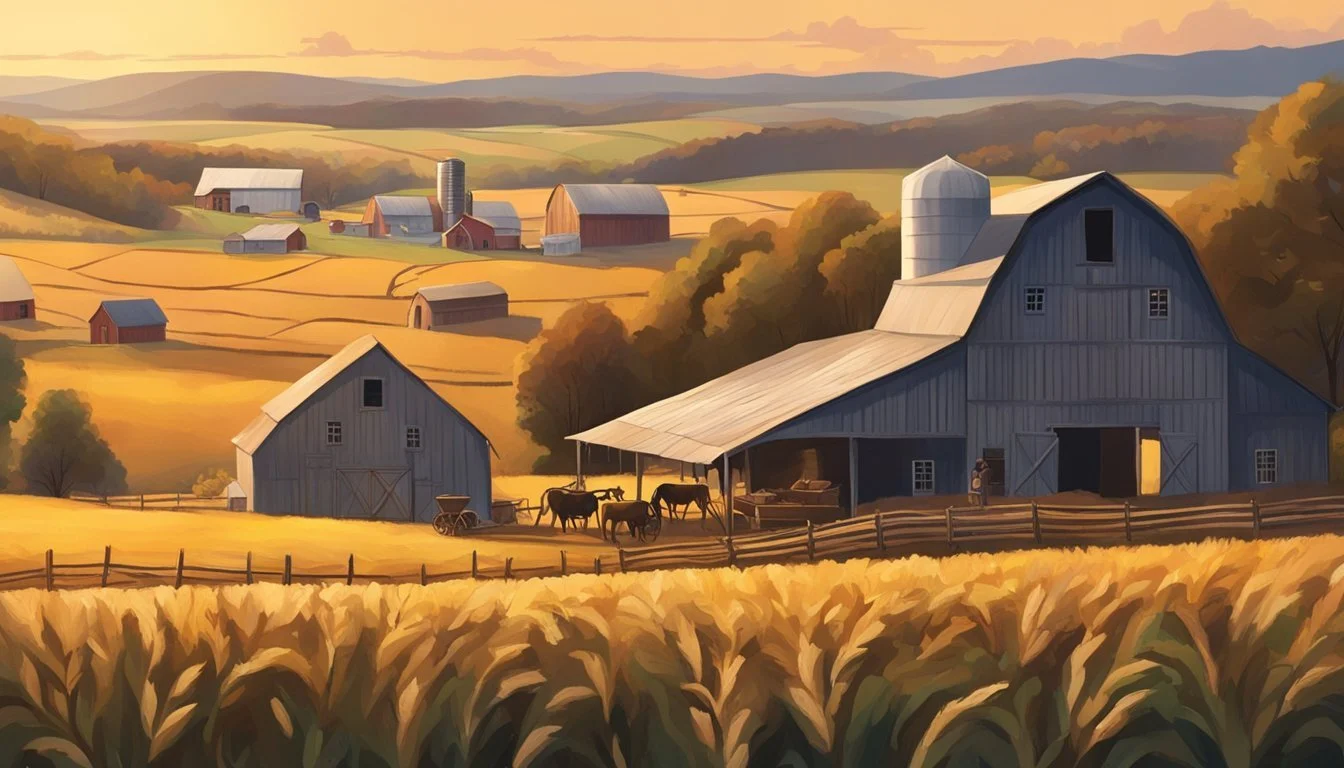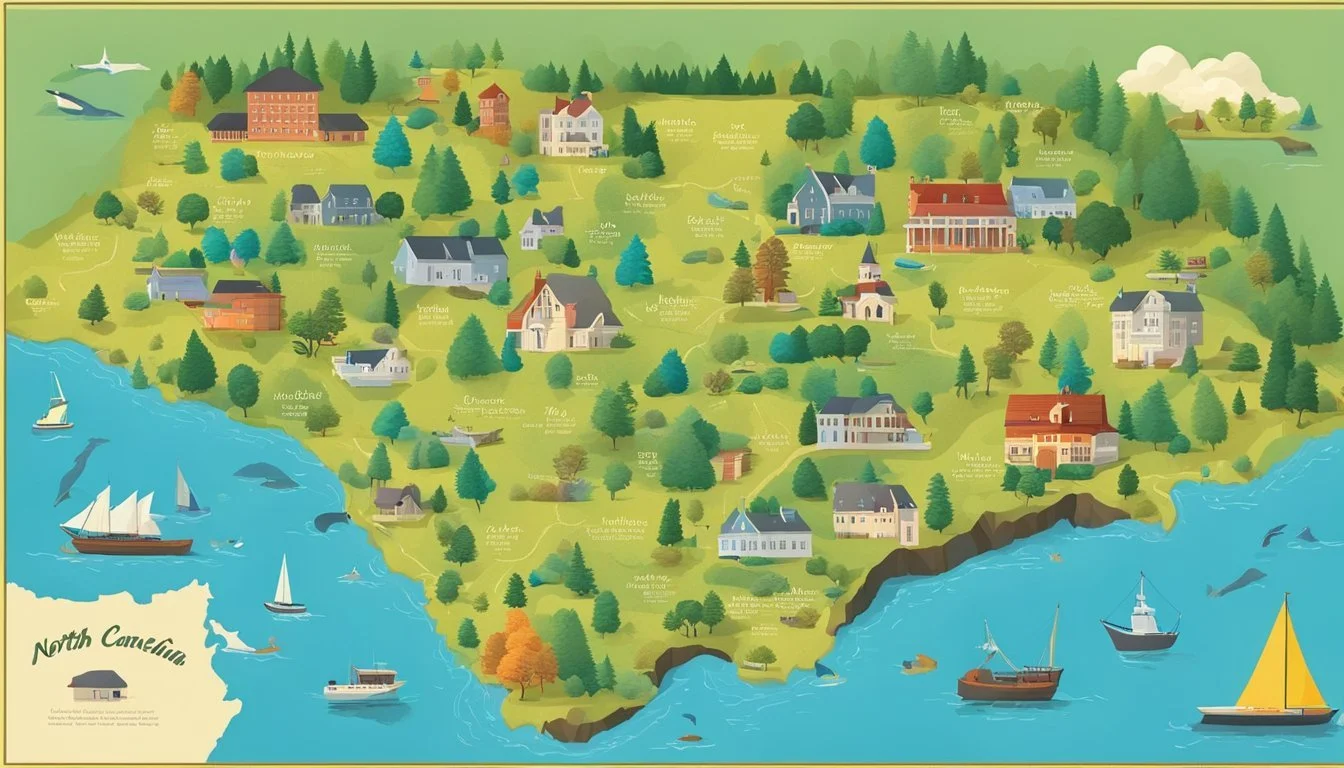8 Illuminating Documentaries About North Carolina
Exploring the Tar Heel State's Rich History and Culture
North Carolina's rich history, diverse landscapes, and vibrant culture have long captivated filmmakers and audiences alike. Documentaries offer a unique lens through which to explore the state's multifaceted identity, from its coastal communities to its mountain towns and everything in between.
These eight illuminating documentaries provide viewers with a deeper understanding of North Carolina's past, present, and future, showcasing the state's triumphs, challenges, and ongoing evolution. Each film offers a distinct perspective on the Tar Heel State, delving into topics such as social issues, environmental concerns, local traditions, and the lives of remarkable individuals who have shaped North Carolina's story.
1) 'A Chef's Life: The Final Harvest' - Vivian Howard
'A Chef's Life: The Final Harvest' is a documentary that serves as the series finale for the acclaimed PBS show 'A Chef's Life'. The film follows Vivian Howard, a renowned chef and restaurateur based in Kinston, North Carolina.
The documentary showcases Howard's dedication to celebrating local cuisine and agriculture. It features a grand farewell feast organized by Howard, set in an open-air dining room carved out of her family's cornfield.
Howard sources the last vegetables of summer from Warren Brothers' farm, highlighting her commitment to using fresh, local ingredients. The event brings together many of the people who have been part of the show's journey over its five seasons.
'The Final Harvest' not only marks the end of the series but also encapsulates Howard's culinary philosophy. It demonstrates her deep connection to North Carolina's food traditions and her innovative approach to Southern cooking.
The documentary offers viewers a glimpse into the behind-the-scenes work that goes into creating a large-scale dining event. It also serves as a tribute to the farmers, producers, and community members who have supported Howard's endeavors.
2) 'The Last Barn Dance' - Directed by Ted Richardson
'The Last Barn Dance' chronicles the struggle of Randy Lewis, a dairy farmer in Alamance County, North Carolina. The short documentary, co-directed by Ted Richardson and Jason Arthurs, offers a poignant look at the challenges facing family farms in the modern economy.
Randy's farm is one of the few remaining in the area, as many others have succumbed to economic pressures. The film focuses not only on his efforts to keep the farm operational but also on his determination to preserve a cherished tradition.
For nearly 50 years, Randy's family has hosted an annual barn dance on their property. This event has become a cornerstone of community life, bringing people together to celebrate rural heritage.
As Randy faces mounting financial difficulties, the fate of both his farm and the beloved barn dance hang in the balance. The documentary captures his resilience and innovative thinking as he seeks ways to adapt and survive.
Through Randy's story, 'The Last Barn Dance' illustrates broader issues affecting rural America. It highlights the importance of preserving agricultural traditions and maintaining connections to the land and community.
3) 'First in Flight: The Legacy of the Wright Brothers' - PBS
This PBS documentary explores the remarkable achievements of Orville and Wilbur Wright. It chronicles their journey from bicycle shop owners to aviation pioneers.
The film highlights the brothers' meticulous research and experiments in Kitty Hawk, North Carolina. It showcases their innovative designs and problem-solving skills that led to the first powered, controlled flight in 1903.
Viewers gain insight into the Wright brothers' perseverance and ingenuity. The documentary examines their rigorous testing process and the challenges they overcame to achieve their historic breakthrough.
Interviews with historians and aviation experts provide context for the Wright brothers' accomplishments. The film also features archival footage and photographs that bring their story to life.
'First in Flight' emphasizes North Carolina's role in aviation history. It showcases how the state's unique landscape and conditions contributed to the Wright brothers' success.
4) 'My Name Is Eugenie Carter' - Directed by Roberto Mighty
Roberto Mighty's documentary 'My Name Is Eugenie Carter' explores the life of a remarkable North Carolina resident. The film sheds light on Carter's experiences as an African American woman in the mid-20th century South.
Mighty, known for his compelling storytelling, captures Carter's journey through segregation and civil rights struggles. The documentary uses a mix of archival footage and intimate interviews to paint a vivid picture of her life.
Carter's resilience and determination are central themes in the film. Mighty skillfully portrays her efforts to overcome racial barriers and contribute to her community.
The documentary also examines Carter's impact on education in North Carolina. It highlights her role as a teacher and mentor to generations of students.
Mighty's directorial style brings authenticity to Carter's narrative. His approach allows viewers to connect with her personal story while understanding its broader historical context.
'My Name Is Eugenie Carter' offers a unique perspective on North Carolina's social history. The film serves as both a personal biography and a window into the state's complex past.
5) 'At the River' - Dr. Carolyn Crowder
'At the River' is a compelling documentary directed by Dr. Carolyn Crowder. The film explores the roles of Presbyterian ministers during the Civil Rights era in the American South.
Crowder, who grew up in Montgomery, Alabama, set out to interview ministers who took stands against segregation and white supremacy. The documentary covers the tumultuous period from 1958 to 1968.
Through interviews and historical footage, 'At the River' tells the stories of 35 ministers who chose to challenge the status quo. These clergy members faced significant risks and opposition within their communities.
The film has been screened in numerous churches across the Southeast, reaching thousands of viewers. It has sparked important conversations about faith, social justice, and racial reconciliation.
Crowder collaborated with producer Rod Murphy to create this feature-length documentary. Their work sheds light on a lesser-known aspect of the Civil Rights Movement.
'At the River' offers a unique perspective on North Carolina's history and its connection to broader social changes in the South. It serves as a powerful reminder of the role faith leaders can play in advancing social justice.
6) 'The Bull City: The Story of Durham's Hayti' - Directed by Lama C. Hale
'The Bull City: The Story of Durham's Hayti' sheds light on a significant chapter in North Carolina's history. This documentary explores the vibrant Hayti district, a historic African-American community in Durham.
Lama C. Hale's film traces Hayti's origins back to the post-Civil War era. It examines how freed slaves established this independent black community on Durham's southern edge.
The documentary highlights Hayti's growth and development alongside Durham's booming tobacco industry. It showcases the district's thriving businesses, including the North Carolina Mutual Insurance Company.
Hale's work captures the spirit of entrepreneurship that defined Hayti. The film features notable figures like John Merrick and Dr. Aaron Moore, who played crucial roles in the community's economic success.
'The Bull City' also delves into Hayti's cultural significance. It explores how the district became a center for African-American art, music, and education in Durham.
The documentary provides a balanced look at Hayti's eventual decline and its lasting impact on Durham's identity. It offers viewers a compelling narrative of resilience, community, and the enduring legacy of the Bull City's historic black neighborhood.
7) 'Milking the Cow: The Story of North Carolina Dairy Farmers' - WUNC
This documentary explores the rich history and current challenges of North Carolina's dairy industry. It traces the evolution of dairy farming in the state from its peak in the mid-20th century to the present day.
The film highlights how North Carolina's dairy production reached a milestone in 1944 when it first produced enough milk for both local consumption and export. It showcases the state's continued support for the dairy industry through annual budget allocations.
Viewers learn about the dramatic changes in the industry over time. In 1945, North Carolina had 400,000 dairy cows. By 2019, this number had decreased to just 44,000.
The documentary introduces viewers to modern dairy operations, such as farms where cows are milked three times daily and produce an average of 26,000 pounds of milk per year. It also explores new opportunities for dairy farmers, including the legalization of herd shares.
Through interviews with farmers, the film provides insight into the challenges and innovations shaping North Carolina's dairy industry today. It paints a picture of an evolving sector adapting to changing consumer demands and economic pressures.
8) 'Tidewater: The Life & Lore of the Outer Banks' - National Geographic
This National Geographic documentary explores the rich history and unique culture of North Carolina's Outer Banks. The film captures the essence of this coastal region, known for its breathtaking landscapes and fascinating legends.
'Tidewater' delves into the area's maritime heritage, showcasing the lives of local fishermen and boat builders who have shaped the region's identity. It highlights the Outer Banks' role in early American history, including the mystery of the lost Roanoke Colony.
The documentary features stunning footage of the area's natural beauty, from the pristine beaches to the diverse wildlife. It also examines the challenges faced by residents, such as coastal erosion and hurricanes.
Viewers are introduced to colorful local characters who share tales of pirates, shipwrecks, and ghostly encounters. These stories, passed down through generations, contribute to the Outer Banks' mystique.
'Tidewater' offers a comprehensive look at the region's ecology, discussing the importance of barrier islands and their fragile ecosystems. It also explores the area's significance for migratory birds and sea turtles.
Cultural Impact of North Carolina Documentaries
North Carolina documentaries have shaped perceptions of the state's history, culture, and identity. These films have cultivated a vibrant filmmaking community while influencing how residents and outsiders view the region.
Influence on Regional Identity
North Carolina documentaries provide a lens into the state's diverse landscapes, communities, and traditions. Films like "Bright Leaves" by Ross McElwee explore the complex legacy of tobacco in North Carolina, connecting personal stories to broader historical narratives. These works challenge stereotypes and offer nuanced portrayals of Southern life.
Documentaries focused on pivotal events, such as "American Coup: Wilmington 1898," shed light on overlooked chapters of state history. By examining racial violence and political upheaval, these films prompt conversations about social justice and historical memory.
The PBS North Carolina network plays a crucial role in producing and distributing documentaries about the state. Their programming, including shows like "NC Weekend" and "My Home, NC," showcases local culture and fosters pride in North Carolina's heritage.
Documentary Filmmaking Community
North Carolina has developed a thriving ecosystem of documentary filmmakers, supported by institutions and festivals. Universities across the state offer film programs that nurture emerging talent. The Full Frame Documentary Film Festival in Durham has become a prestigious platform for showcasing nonfiction cinema.
Local filmmakers often collaborate with national organizations like PBS and American Experience, expanding the reach of North Carolina stories. This partnership model allows for high-quality productions that resonate beyond state borders.
The success of North Carolina documentaries has inspired new generations of filmmakers to explore regional topics. Grant programs and workshops provide resources for aspiring documentarians to develop their craft and tell untold stories about the state.
Themes Explored in North Carolina Documentaries
North Carolina documentaries delve into the state's rich history and pressing environmental issues. Filmmakers shed light on pivotal moments and ongoing challenges that shape the region's identity.
Historical Perspectives
North Carolina's documentaries often focus on key historical events and figures. Films explore the state's role in the Civil Rights Movement, highlighting leaders like George Henry White. The impact of industries like tobacco farming features prominently, examining both economic and social effects on communities. Some documentaries investigate lesser-known aspects of North Carolina history, uncovering stories of resilience and cultural heritage.
Filmmakers also examine the evolution of Jim Crow laws and their lasting consequences. These works provide context for understanding current social dynamics in the state. By connecting past and present, they offer viewers a deeper appreciation of North Carolina's complex historical tapestry.
Environmental Advocacy
Environmental themes take center stage in many North Carolina documentaries. Filmmakers spotlight the state's diverse ecosystems, from the Appalachian Mountains to the Outer Banks. Conservation efforts for endangered species and habitats are frequently highlighted, raising awareness about biodiversity challenges.
Climate change impacts on coastal communities receive significant attention. Documentaries explore rising sea levels, intensifying storms, and their effects on local economies and ways of life. Some films focus on sustainable agriculture practices and the growth of organic farming in the state.
Water quality issues, particularly in relation to industrial and agricultural runoff, are examined in depth. These documentaries often serve as calls to action, encouraging viewers to engage with environmental protection efforts in their communities.









